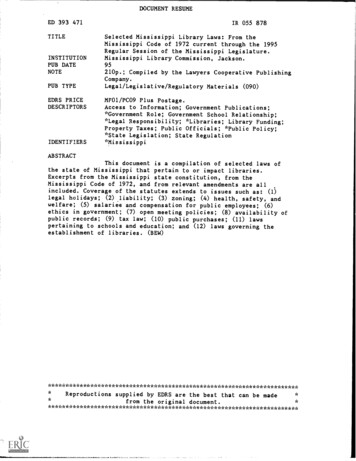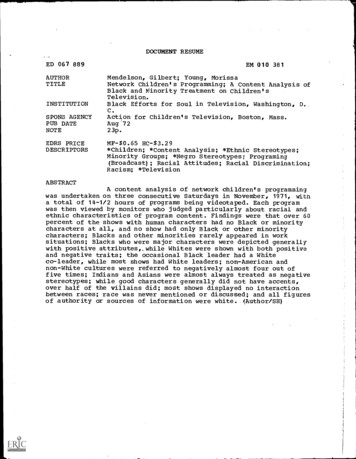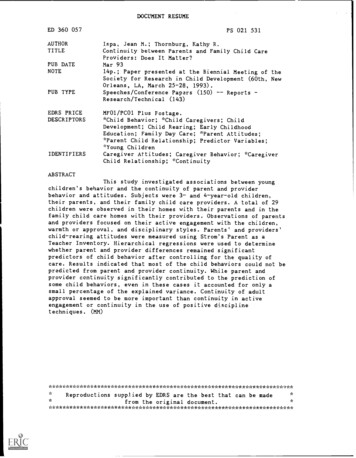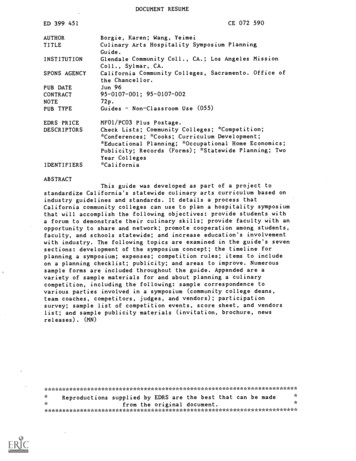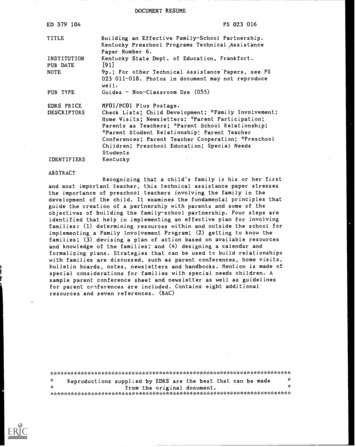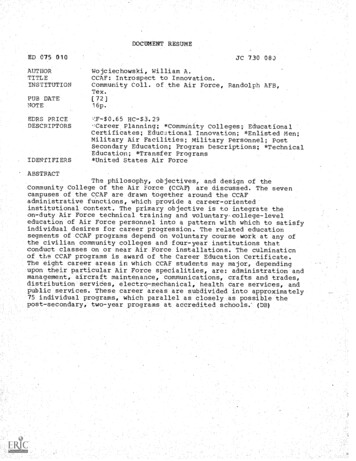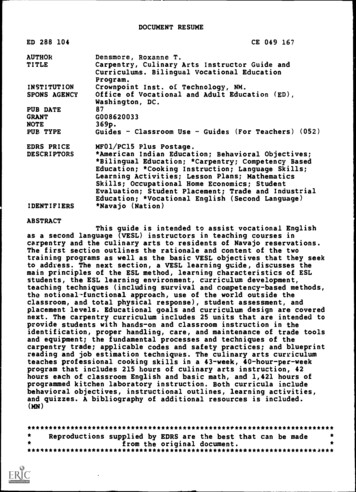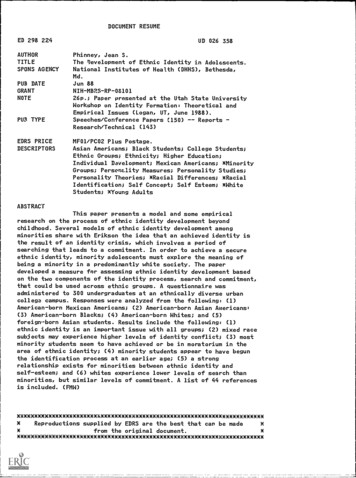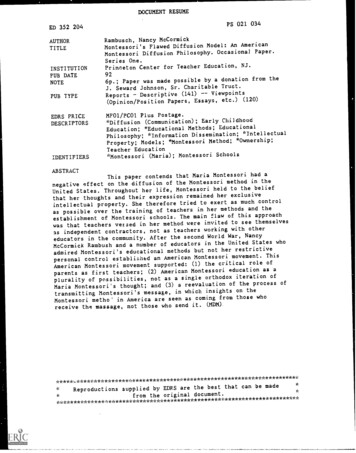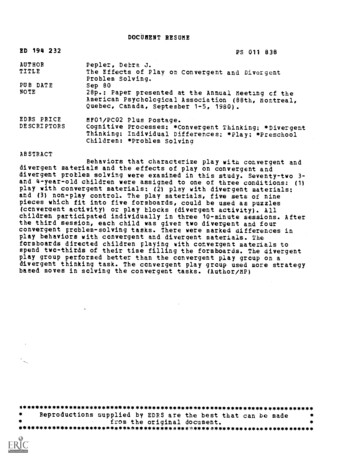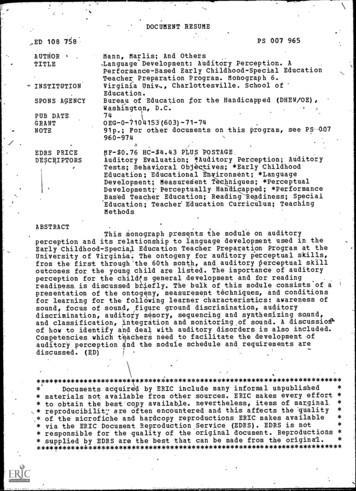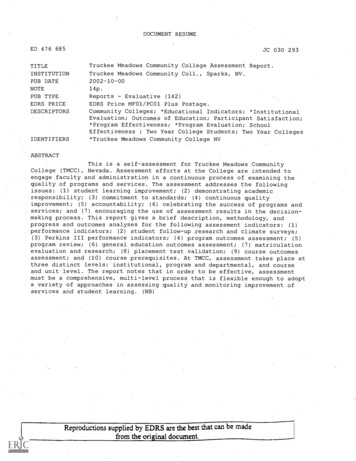
Transcription
DOCUMENT RESUMEED 476 685TITLEINSTITUTIONPUB DATENOTEPUB TYPEEDRS PRICEDESCRIPTORSIDENTIFIERSJC 030 293Truckee Meadows Community College Assessment Report.Truckee Meadows Community Coll., Sparks, NV.2002-10-0014p.ReportsEvaluative (142)EDRS Price MF01/PC01 Plus Postage.Community Colleges; *Educational Indicators; *InstitutionalEvaluation; Outcomes of Education; Participant Satisfaction;*Program Effectiveness; *Program Evaluation; SchoolEffectiveness ; Two Year College Students; Two Year Colleges*Truckee Meadows Community College NVABSTRACTThis is a self-assessment for Truckee Meadows CommunityCollege (TMCC), Nevada. Assessment efforts at the College are intended toengage faculty and administration in a continuous process of examining thequality of programs and services. The assessment addresses the followingissues: (1) student learning improvement; (2) demonstrating academicresponsibility; (3) commitment to standards; (4) continuous qualityimprovement; (5) accountability; (6) celebrating the success of programs andservices; and (7) encouraging the use of assessment results in the decisionmaking process. This report gives a brief description, methodology, andprogress and outcomes analyses for the following assessment indicators: (1)performance indicators; (2) student follow-up research and climate surveys;(3) Perkins III performance indicators; (4) program outcomes assessment; (5)program review; (6) general education outcomes assessment; (7) matriculationevaluation and research; (8) placement test validation; (9) course outcomesassessment; and (10) course prerequisites. At TMCC, assessment takes place atthree distinct levels: institutional, program and departmental, and courseand unit level. The report notes that in order to be effective, assessmentmust be a comprehensive, multi-level process that is flexible enough to adopta varietyof approaches in assessing quality and monitoring improvement ofservices and student learning. (NB)Reproductions supplied by EDRS are the best that can be madefrom the original document
Truckee Meadows Community CollegeAssessment ReportOctober 2002Office of Institutional Research and AssessmentU.S. DEPARTMENT OF EDUCATIONOffice of Educational Research and ImprovementEDUCATIONAL RESOURCES INFORMATIONCENTER (ERIC)This document has been reproduced asreceived from the person or organizationoriginating it.PERMISSION TO REPRODUCE ANDDISSEMINATE THIS MATERIAL HASBEEN GRANTED BYD. KeeblerMinor changes have been made to improvereproduction qualityoTO THE EDUCATIONAL RESOURCESINFORMATION CENTER (ERIC)Points of view or opinions stated in thisdocument do not necessarily representofficial OERI position or policy.1BEST COPY AVAILABLE2
ASSESSMENT at TMCCAssessment PhilosophyTMCC is committed to improving the student learning process through the continual assessmentof institutional effectiveness. Assessment efforts at the College are intended to engage facultyand administration in a continuous process of examining the quality of programs and services.Assessment at TMCC is about: Student learning improvement Demonstrating academic responsibility Commitment to standards Continuous quality improvement Accountability Celebrating the success of our programs and services Encouraging the use of assessment results in the decision- making processTMCC faculty and administration believe in continuous assessment of college programs andservices and their relationship to the college mission, values and strategic direction. Assessmentdirectly relates and drives one of the major college initiatives: Achieving Academic Excellence.The Academic Excellence Initiative emphasizes student learning. The efforts of faculty andadministration are directed at ensuring continual progress, keeping teaching and learning at thecore of our mission, supporting innovation and faculty development, recruiting and hiringqualified faculty, reviewing our programs, and regularly asking ourselves what we can do toestablish the highest expectations for all of our students.3Assessment Report, October 20021 of 12Office of Institutional Research and Assessment
ASSESSMENT at TMCCLevels of AssessmentIt is critical for the success of assessment as a campus-wide initiative to clearly determine itsplace and articulate its relevance to the entire planning and operational process of the College.In order to become an effective effort, assessment must be a comprehensive, multi- level processthat is flexible enough to adopt a variety of approaches in assessing quality and monitoringimprovement of services and student learning. At TMCC, assessment takes place at threedistinct levels:Institutional: The primary goal at this level is theassessment of iistitutional effectiveness. At a campuswide level, evaluations take place to determine how well,and in what ways, the College is accomplishing its missionand goals.Assessment Components:Local Performance Indic atorsSatisfaction & Climate SurveysStudent Follow-up ResearchPerkins III Performance IndicatorsOperations Research (organizational operations)Program & Departmental: Assessment at this levelseeks to evaluate the effectiveness of instructionalprograms and services provided to TMCC studentsAssessment Components:Program Outcomes AssessmentProgram ReviewGeneral Education Outcomes AssessmentMatriculation Evaluation & ResearchPlacement Test Local ValidationCourse & Unit Level: Assessment atInstitutional Analysis,Accountability, &Improvementthis levelfocuses on individual courses, their content, as well astheir relevance to students' objectives and College goals.Assessment Components:Course Outcomes AssessmentCourse Prerequisites4Assessment Report, October 20022 of 12Office of Institutional Research & Assessment
Assessment ComponentPerformance IndicatorsDESCRIPTIONASSESSMENT REPORT 2002Level: InstitutionalCollege-wide performance indicators are measured on an annualbasis. The indicators are categorized into six areas of inquiry.The measurement of TMCC's performance indicators covers abroad array of outcomes-based assessment at the institutionallevel.METHODSPerformance indicators are documented on a one-page templatethat records the following items: area of inquiry, rationale,definition, source, and outcome analysis. Each indicator is aself-contained piece of research that is meant to quickly informthe reader on progress made by the institution, as well as themethodology utilized to compute the measure. There are sixareas of inquiry: Access and Equity, Employment Preparation &Placement, Instructional Effectiveness, Resource onalandDevelopmental and Remedial.PROGRESS & OUTCOMESSpring 2002 marks the fifth year in which performanceindicators have been measured at TMCC. The indicators havebeen adjusted from their original edition to reflect a core set ofmeasurable outcomes. Performance indicators are completedand reviewed by institution on an annual basis.5Assessment Report, October 20023 of 12Office of Institutional Research and Assessment
Assessment Component:Student Follow-up Research & Climate SurveysDESCRIPTIONASSESSMENT REPORT 2002Level: InstitutionalA variety of methods are employed to conduct student followup research. In addition to utilizing enrollment and transcriptdata to track student success, TMCC engages in three annualsurvey research endeavors. First, all graduates are asked tocomplete a questionnaire inquiring about their level ofsatisfaction with general and technical education, as well asselected student services. Second, a one-year graduate followup survey is disseminated aimed at assessing the impact theCollege has had upon its graduates. To compliment theseresearch projects, every three years the College distributescampus-wide student, faculty, and staff climate surveys, as wellas a community/employer questionnaire.METHODSPROGRESS & OUTCOMESEach survey research projectmethodology.containsitownspecificThe Office of Institutional Research & Assessment conducts allcampus-wide satisfaction, climate, and follow-up surveys. Allsurvey results are posted on the TMCC web site.6Assessment Report, October 20024 of 12Office of Institutional Research and Assessment
Assessment Component:Perkins III Performance IndicatorsASSESSMENT REPORT 2002Level: InstitutionalIn compliance with the Nevada Department of Education andCarl Perkins funding requirements, TMCC completes a series ofoccupational related performance indicators. This researchcombines cohort tracking, academic performance, andgraduation rate measures for all occupational students, as wellDESCRIPTIONas a variety of special populations.This set of performance indicators seeks to measure the successMETHODSof occupational students who meet a defined threshold ofvocational/technical training at the college. A cohort of firsttime, vocational degree-seeking students are isolated. Thiscohort is then given three years to accumulated occupationalrelated credit hours (threshold).Grade pointaverage,graduation rate, and enrollment in non-traditional courses arethen tracked.IIIIIThe Office of Institutional Research & Assessment isrespons ble for computing the Perkins III performanceindicators and does so on an annual basis. Performanceindicators report is submitted to the Nevada Department ofEducation on an annual basis.7Assessment Report, October 20025 of 12Office of Institutional Research and Assessment
Assessment Component:Program Outcomes AssessmentDESCRIPTIONASSESSMENT REPORT 2002Level: Program & DepartmentalProgram Outcomes Assessment is the systematic gathering,interpretations, and use of information about student learningfor purposes of improvement of all TMCC programs (sequenceof courses, degree or certificate). Outcomes Assessmentprocess encourages TMCC programs to make expectations andstandards for quality explicit and public. Each program isexpected to engage in a systematic gathering of evidence onhow well performance matches those expectations andstandards. Any proposal for a new/revised program, degree orcertificate must be accompanied by the outcomes assessmentplan reviewed by the Institutional Research & AssessmentOffice.METHODSAll TMCC programs are encouraged to develop the assessmentprocess in a way that is most responsive to the needs of theirprogram. However, all programs must adhere to the followinggeneral principles and methods of developing and assessingprogram outcomes:1. Program outcomes are assessed for the entire program orselected sequence of courses.2.Program outcomes are expressed as skills, knowledgeareas, and/or changes in attitude that program expectsstudents to express as a result of successfully completingthe program/sequence of courses.3. Program outcomes are measurable and assessable.4. Multiple assessment methods are used (direct, indirect)5. Program Assessment Plans are reviewed every 3 years.6. Program Outcomes Assessment results are collected onan annual basis and stored by either department orOffice of Institutional Research and Assessment.7. Program Outcomes Assessment results are analyzed andused for planning and improvement process.PROGRESS & OUTCOMESCurrently the majority of TMCC programs (26) have completedtheir outcomes assessment plans and these documents arepublished on the TMCC web site. Fifteen programs are due toreport the results of their assessment activities by the end of theFall 2002 semester, with the remaining programs reporting theresults next Fall 2003.8Assessment Report, October 20026 of 12Office of Institutional Research and Assessment
Assessment Component:Program ReviewDESCRIPTIONASSESSMENT REPORT 2002Level: Program & DepartmentalProgram Review is a means of reporting on collected data aboutthe vitality of TMCC programs. This is a tool to measureprogrammatic effectiveness, the results of which are used forProgram review evaluatesimprovement.programs based on the following categories: enrollment trends,staffing trends, physical facilities, and equipment. The reviewincludes multiple criteria of assessment, including bothqualitative and quantitative dimensions of program effectiveness,programmaticand peer review.METHODSA model was designed within the last year that outlines theprocess of program review campus-wide. It is the role of thedepartment chair, coordinator or responsible faculty assigned bythe Dean to compile the necessary information to write theevaluation of the program addressing both strengths andReviews may result in one or morerecommendations which require a plan to improve some aspectof a program. In such case, a program will be asked to developa plan to address the recommendations. The formal programreview is on a 5-year cycle. In particular situations, a review isconducted after the first year of a rew program. An impartialexpert from outside TMCC may be called to write the Programweaknesses.Review.PROGRESS & OUTCOMESProgram Review is conducted according to the scheduleprepared by the Office of the Academic Vice President. Thefollowing programs have been reviewed during 2001-2002academic year:Dental HygieneRadio logic Technology9Assessment Report, October 20027 of 12Office of Institutional Research and Assessment
Assessment Component:General Education Outcomes AssessmentASSESSMENT REPORT 2002Level: Program & DepartmentalAll students receiving degrees at TMCC are requiered tocomplete a set of general education courses from ten generalDESCRIPTIONeducation areas: Communications, English, Diversity, Fine Arts,Constitution, Humanities,Science,HumanRelations,Mathematics, Social Science. Assessment of general educationconsists of identifying specific outcomes of general educationcourses and evaluating the achievement of those outcomes.METHODSThe general education learning outcomes are reflected in thegeneral education core (i.e. required classes that every studentmust take in order to receive a degree). All courses designatedas general education courses are required to demonstrate to theCurriculum Committee how the content of the course reflectsthe general education skills and how student success inacquiring those skills is evaluated. In addition, each of the tengeneral education areas develops outcomes and identifiesmeasures to assess student skills and learning experiences usinghome-grown assessment methods embedded in the curriculum.IIDICurrently, a campus-wide initiative on general education isunderway. Each general education area, which is comprised ofvarious courses, is in the process of identifying specificoutcomes and tools to assess the effectiveness of studentlearning in each area respectively. In addition, the AcademicStandards subcommittee of the Faculty Senate is finalizing thestatement of general education philosophy at TMCC.l0Assessment Report, October 20028 of 12Office of Institutional Research and Assessment
Assessment Component:Matriculation Evaluation & ResearchDESCRIPTIONASSESSMENT REPORT 2002Level: Program & DepartmentalIn Fall 2001 TMCC implemented a new matriculation policy.This initiative was carried out through QUEST (QualityEducation Starts at TMCC), a first -year experience programdesigned to help students be successful in college from the start.This program representes a concerted effort on the part of thecollege to expose first-time students to a variety of studentservices in order to maximaize their academic success. Studentsare given advisement with the oportunity to creat an educationplan, assessment, early registration, college success skillscourse, etc.11All new first-time students enrolling in 12 or more credits areencouraged to sign up for QUEST As QUEST participants,upon taking assessment tests and receiving advisement, thesestudents are enrolled in math, English, study success skillscourses and elective of their choice during the first semester.The progress and success of participants is monitored bysurveying students and conducting follow-up student successresearch.The QUEST program is in its third semester. Enrollment in theprogram nearly doubled (from 99 students in Fall 2001 to 162students in Fall 2002 with addition of 30 international students).Follow-up research conducted indicates that QUESTparticipants persist at a higher rate than first-time degreeseeking students who did not participate in the program.11Assessment Report, October 20029 of 12Office ofInstitutional Research and Assessment
Assessment Compon ent:Placement Test ValidationDESCRIPTIONMETHODSASSESSMENT REPORT 2002Level: Program & Departmentallocal validation of the College's placement test( ACCUPLACER) must occur on an ongoing basis. Validationresearch entails establishing a relationship between a criterionmeasure (e.g., final grades) and placement test scores.Validation efforts are essential for ensuring that placement testscores possess an acceptable level of predictive validity andconnection to TMCC's curriculum.TheIn order to conduct a validation study the following must be inplace:1. A statistically significant number of students who havetaken the placement test and enrolled in coursesrequiring a test score2. An agreed upon criterion measure (grades vs. instructorratings)3. Standardized competencies and expected outcomesthroughout a curriculum utilizing placement test scoresSeveral validation studies have taken place. A study of studentsuccess in Math 096 (Intermediate Algebra) has beenconducted, tracking further success in Math 120 (College LevelMath). This study correlated the placement of students based onACCUPLACER scores with their success in the course ofplacement and subsequent course. Similar studies have beenconducted in English 090 (remedial course). The placementrates in math and English are monitored every Fall semester. Inaddition, a testing and placement system has been developed forESL students.12Assessment Report, October 200210 of 12Office of Institutional Research and Assessment
Assessment Component:Course Outcomes AssessmentDESCRIPTIONMETHODSASSESSMENT REPORT 2002Level: Course/UnitThis process is focusing on individual courses outcomes andtheir assessment.All faculty members at TMCC are encouraged to outline andassess individual course outcomes. The Master Course Outlinerequired for every course, must include course outcomes anddescription of how those outcomes are to be assessed. Beforeany new or revised course is approved the TMCC CurriculumCommittee reviews the Master Course Outline to ensureOn-going research isassessment in individual courses.conducted by faculty members in conjunction with the Office ofInstitutional Research and Assessment to track student successin individual courses.PROGRESS & OUTCOMESIn addition to the efforts by the Curriculum Committee,workshops are conducted annually to provide for faculty'sexchange of best assessment practices, as well as opportunitiesto receive new information on most effective classroomassessment techniques. Below are just a few examples of thetypes of studies conducted on an on-going basis that are focusedon assessment of individual courses:Chemistry 101 Assessment Project: multi-semesterproject designed to pilot-test a chemistry placementinstrument by the National Chemical Society, researchcorrelation between completion of college level mathand success in basic chemistry course and to gatherinformation about students' study habitsMath 091 & 093 Study : this assessment project focusedon assessing performance of students in the most basicremedial math courses, aimed at identifying ways ofdeveloping more precise assessment and placement ofstudentsStudent Success in Computer-based Math Coursesthis projectTraditional Math Courses:vs.investigated the success of students in Math 095courses(Elementary Algebra) using a computer-based mode ofinstructions in comparison to Math 095 courses taught ina more traditional lecture format.13Assessment Report, October 200211 of 12Office of Institutional Research and Assessment
Assessment Component:Course PrerequisitesDESCRIPTIONASSESSMENT REPORT 2002Level: Course/Uni
for purposes of improvement of all TMCC programs (sequence of courses, degree or certificate). Outcomes Assessment process encourages TMCC programs to make expectations and standards for quality explicit and public. Each program is expected to engage in a systematic gathering of evidence o
